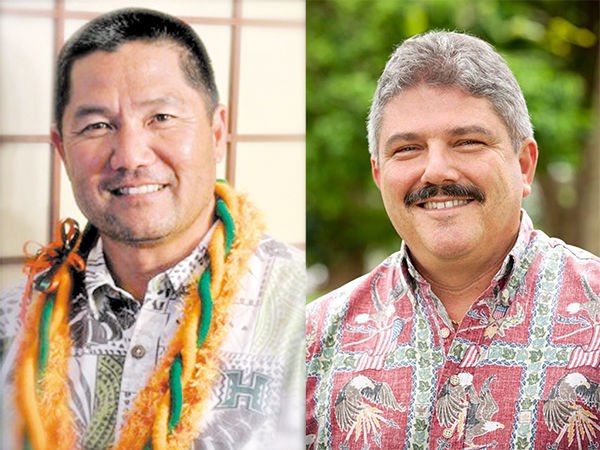LIHUE — Kauai County Councilmen Mel Rapozo and Ross Kagawa say they have had enough. The two councilmen have been working on legislation to rescind the county’s law that regulates genetically modified organisms and pesticides produced by large-scale agricultural companies. A federal
LIHUE — Kauai County Councilmen Mel Rapozo and Ross Kagawa say they have had enough.
The two councilmen have been working on legislation to rescind the county’s law that regulates genetically modified organisms and pesticides produced by large-scale agricultural companies. A federal court judge ruled the law invalid in August.
“For us, we’re saying, ‘We lost in court, so let’s stop the bleeding already — stop spending money on it,’” said Kagawa, who along with Rapozo, cast dissenting votes against the law’s approval last year. “If we repeal it, we don’t need to spend any more money on the appeal. Basically, we have no confidence that the appeal is going to be any different than the first ruling.”
It’s a view that the County Council will have a chance to revisit on Wednesday, when Bill 2562, their proposal to repeal Ordinance 960, will appear for first reading.
Councilman Gary Hooser, who co-introduced Bill 2491, now Ordinance 960, last year, decried the repeal proposal and questioned its timing immediately after the general election.
“This bill right before Election Day smacks of political gamesmanship and meant to divide,” Hooser wrote in an email. “It is opportunism at its worst at the expense of our people. Everyone needs to see this act for what it is and get out the vote to defend the health and future of our precious island.”
Councilman Tim Bynum, the other co-introducer of the bill, agreed.
“I am surprised Mel and Ross would seek to repeal Ordinance 960 now,” Bynum wrote in an email. “Why put this question before the current majority who just reaffirmed their commitment to continue efforts to protect resident’s health and safety by voting to appeal? Why not wait a few weeks and see if they succeed in throwing out the five current incumbents that set our current course to appeal the decision.”
In September, an appeal to uphold Ordinance 960 was filed in the 9th U.S. Circuit Court of Appeals in San Francisco.
The cost of that appeal, at least for the County of Kauai, has been capped at $12,750 following an offer from the county’s law firm, McCorriston Miller Mukai MacKinnon, LLP, to waive future legal fees beyond the $210,000 previously authorized.
A separate appeal to defend Ordinance 960 has also been filed in the appellate court by Earthjustice and the Center for Food Safety on behalf of Ka Makani Hoopono, Center for Food Safety, Pesticide Action Network North America and the Surfrider Foundation.
In all, at least $166,119.89 has been spent so far on legal efforts to defend the county law, according to Office of the County Attorney.
The timing of the repeal proposal’s introduction, Rapozo said, was scheduled by coincidence after it was drafted in August — four days after U.S. Magistrate Judge Barry Kurren released his decision to invalidate Ordinance 960.
“What 2491 did is that it divided the community, the appeal divided the community,” Rapozo said. “What I’m trying to do is get this out of litigation. What has 2491 and 960 done to the people of Kauai as far as public health and safety? Absolutely nothing. It has got us in court and a huge attorney bill.”
County spokeswoman Beth Tokioka said officials are not sure whether the county would be able to recoup some of the money allocated and approved by the County Council to appeal the federal court’s ruling on Ordinance 960, if a repeal is approved.
“The mayor is very interested in this discussion, especially in light of the fact that the basic components of the bill (buffer zones, disclosure and a public health impact study) are all being pursued by the state through the Good Neighbor Program and the recently announced Joint Fact Finding (JFF) effort,” Tokioka wrote in an email.
The embattled county law, which was passed in November 2013, requires commercial agricultural companies that purchased or used more than five pounds, or 15 gallons, of any restricted use pesticide to publicly disclose them and create buffer zones around sensitive areas, including daycare centers, schools, nursing homes and medical facilities.
Those same companies, under the law, must also disclose any genetically modified organisms (GMO) that they possess. It also imposes civil fines for any law violations, ranging from $10,000 to $25,000 per day for each violation.
A spokesperson for the four seed companies that filed a lawsuit against the County of Kauai following the passage of Ordinance 960, had little to say about the proposal to rescind the county’s law.
“The companies learned of the proposed bill only recently and are evaluating its potential impacts,” Dow AgroSciences spokeswoman Robyn Heine wrote in a joint statement from Dow AgroSciences, Syngenta, BASF and DuPont Pioneer.
“Everyone except the seed companies, of course, has concerns about it, since the court decision overturning Ordinance 960 is currently on appeal, and the bill’s only purpose is to moot that appeal,” Earthjustice attorney Paul Achitoff wrote in an email.


